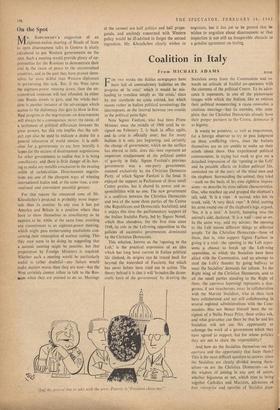On the Spot
Mk. IRUSHCHEV'S suggestion of an eighteen-nation. meeting of Heads of State to open disarmament talks in Geneva is nicely ,calculated to put Western governments on the spot. Such a meeting would provide plenty of op- portunities fur the Russians to demonstrate „their zeal in the cause of peace to the uncommitted countries, and in the past they have proved them- selves fat more skilful than Western diplomats in pet forming this task. But, if the West turns the eighteen-power meeting down, then the un- committed countries will feel offended. In either case Russia stands to gain, and the whole inci- dent is another instance of the advantages which accrue to the diplomacy that gets its blow in first. Real progress in the negotiations on disarmament will always be a consequence. never the cause, of a settlement of political differences between the great powers, but this role implies that the sub- ject can also be used to indicate a desire for a general relaxation of world tension. It is sull- dent for p government to say how heartily it hopes for the success of disarmament negotiations for other governments to realise that it is being conciliatory. and there is little danger of its hav- ing to make any notable concession in the ensuing mi:Qe of technicalities. Disarmament negotia- tions are one of the cheapest ways of winning international kudos and, at the same time, a con- ventional and convenient peaceful gesture.
For this reason the measured tone of Mr. Khrushchev's proposal is probably more impor- tant than its content. In any case it has put America and Britain in a position where they have to show themselves as conciliatory as he appears to be, while, at the same time, avoiding any commitment to an eighteen-power meeting, which might pass embarrassing resolutions con- cerning their resumption of nuclear testing. This, they now seem to be doing by suggesting that a summit meeting might be possible. but that preparation by Foreign Ministers is required. Whether such a meeting would be particularly useful is rather doubtful—any failure would make matters worse than they are now—but the West certainly cannot refuse to talk to the Rus- sians when they are pressed to do so. Meetings at the summit are half politics and half propa- ganda, and anybody concerned with Western policy would be ill-advised to forget the second ingredient. Mr. Khrushchev clearly wishes to negotiate, but it has yet to be proved that he wishes to negotiate about disarmament or that inspection is not still an insuperable obstacle to a genuine agreement on testing.

































 Previous page
Previous page